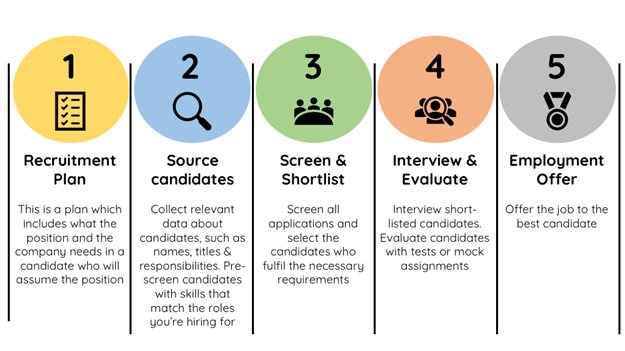Hiring the right staff is one of the most important factors that determine the success of your business. Hire the right people and you'll have a high-performing, happy team that gets you results. Hire just one wrong person, and you'll spend a lot of time and emotional energy trying to fix your problem. Small businesses often don't have a dedicated HR or recruitment manager, meaning it's often an owner or manager who is responsible for hiring. An effective and efficient candidate sourcing process is therefore key to finding and hiring qualified people. In this piece, we answer frequently asked questions about candidate sourcing to help you build strategies to attract the best staff.
What is candidate sourcing?
Sourcing is the proactive searching for qualified candidates for current or planned positions. Candidates are generally sourced by referrals, posting jobs on job boards, social media sites or using recruitment agencies.
The aim of sourcing is to:
- Collect relevant data about qualified candidates, such as names, titles and job responsibilities
- Pre-screen candidates with skills that match the roles you’re hiring for
- Contact candidates to build relationships and inform them about job openings
- Build long-term relationships with potential hires
What is the difference between sourcing and recruiting?
Sourcing refers to the process of searching for, identifying and contacting potential candidates. Recruiting only kicks in after sourcing and includes screening, interviewing and evaluating applicants.

The Recruitment Process
click to enlargeWhat is the best channel to source candidates?
Sourcing candidates can be time consuming and admin-intensive. By picking the right sourcing channels you can significantly reduce the required effort and sourcing costs.
Here are pros and cons of some well-established sourcing channels in South Africa:
Referrals
One of the most popular channels is referrals - where your existing staff recommend people they know. This is often the most common channel for retail and hospitality businesses.
Pro: Often no cost associated with this type of sourcing. Existing staff know your company culture and needs, and can often find the right profile within their network.
Con: Unfortunately, many referrals are friends or family of existing staff, which can result in complexity. Often candidates who are referred are not suited to the job. We’ve also seen many instances of fraud and theft by staff who knew each other prior to working together.
Recruitment agencies
Pro: Recruitment agencies source, screen and manage the entire recruitment process from end to end and only charge you if you make a hire.
Con: Agency fees are as high at 20% of the annual salary. Many small businesses can’t afford to pay these types of fees, and for retail jobs like shop assistants or cashiers, these fees are not viable.
LinkedIn
Pro: A LinkedIn Recruiter license lets you search profiles and send personal messages (InMails) to potential candidates.
Con: Cost and limited to certain professional pools.
Twitter
Pro: Twitter offers various tools, like Search, Lists and Chat that help recruiters source candidates.
Con: Twitter's reach in South Africa is very limited and so you may struggle to reach the right candidates with your job advert.
Facebook
Pro: You can tap into Facebook's large pool of people with Facebook jobs or use Facebook groups to help you find your desired future hires.
Cons: So many irrelevant applicants and lots of time spent sorting through profiles.
Job boards
Pro: A job board is essentially an online classified for job seekers and employers. They are convenient spaces to find candidates. Some job boards have an advanced search option helps you scan CVs based on criteria like location and job title.
Con: If you post a job on any job board, you will probably get flooded with mostly irrelevant applications. This means you will have to screen a lot of CVs, which can be very time consuming.
Giraffe
Pro: Giraffe is a job board that automatically screens candidates so you don’t have to. Giraffe also supplements candidate CV's with voice clips, giving the employer a good view of the candidate and saving a lot of time.
Con: Giraffe is best suited to medium-skilled and entry-level candidate sourcing, with a base of at least 1-million candidates in this demographic. Giraffe is, however, not the best space to hire a senior executive.










































